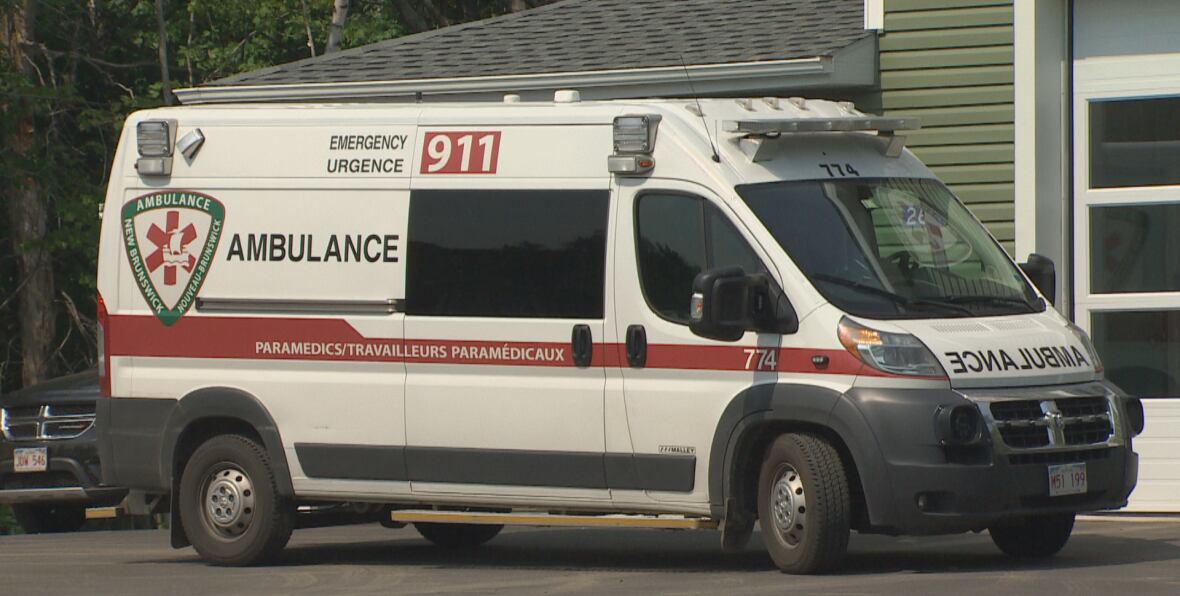'No clear-cut answer': First responders mourn loss of Saint John paramedic
'It's like a piece of our family has been ripped out,' Joe Cormier says of partner's suicide

Dozens of paramedics paid their final respects Wednesday to 44-year-old Kevin McCormick, a Saint John-area ambulance worker with a ready smile that belied the sadness that ultimately killed him.
"It's like a piece of our family has been ripped out," said Joe Cormier, a paramedic who had partnered with McCormick since 2010.

"Kevin was that guy with a big smile and a big hug that was over the top. He was always happy. He was always making people laugh."
"That was the public Kevin."
The two had worked together one week before McCormick's body was recovered from his parents' home on Saturday.
He had committed suicide, the sixth suicide by a first responder in New Brunswick in the past four years, according to the Tema Conter Memorial Trust, a national charity that tracks such incidents.
Because an ambulance was dispatched to the scene, word of McCormick's death spread rapidly through the province's paramedic community. His colleagues reported his suicide to the Tema Conter trust.
When asked what might have triggered his partner to act so decisively, Cormier replied it was hard to say.
"There's no clear-cut answer here," he said.
'I would definitely let him look after my family. There's only certain people you want looking after your children or your family.'- Kevin Darrah, paramedic
More than 150 first responders, including at least 100 paramedics, came to McCormick's funeral in Grand Bay-Westfield.
Those who attended the service described it as sometimes intensely emotional.
Following a tradition known as the paramedic's last call, radio dispatch called three times for McCormick by his number, 4229.
On the third attempt, and with no answer forthcoming, the director of operations announced: "It is with deep regret and sorrow that we must announce that paramedic McCormick has answered his last call and has returned home safely, where he awaits his next assignment.
"Paramedic McCormick, everyone here at Ambulance New Brunswick thanks you for your dedicated service and we will never forget your Honour, Courage and Duty."
At this point in the service, there wasn't a dry eye in the house, Cormier said.
According to the Tema Conter Memorial Trust, McCormick's unexpected death is the third suicide by a New Brunswick paramedic since the charity started tracking numbers by word of mouth in 2014.
Some think the real number is higher.
Fredericton paramedic Kevin Darrah believes there have been at least six suicides in the past 10 years.
Long hours
Darrah said the job is stressful, both because of the human injury and damage a paramedic sees, but also because most shifts are 12 hours long.
And on top of that, he said, many paramedics have to travel long distances to get to their assigned stations.
"Kevin was a great paramedic," said Darrah, who remembers working with McCormick when both were stationed in Quispamsis.
"I would definitely let him look after my family. There's only certain people you want looking after your children or your family."
Ambulance New Brunswick declined to provide any information on suicide incidents among its 950 paramedics or any statistics related to the diagnosis of post-traumatic stress disorder or treatment.
"Ambulance New Brunswick does not discuss personnel issues due to confidentiality," Jean-Pierre Savoie, director of operations, said in an emailed statement to CBC News.
Help for staff
The service said it continues to evaluate and develop programs to help support the needs of its staff.
Savoie provided examples of existing programs, including an enhanced employee assistance program, which includes short-term counselling by mental health specialists as well as an online support centre.
He also said there's a referral program with pre-screened psychologists who specialize in PTSD, critical incident stress management, a peer support and debriefing team, and in training to help employees understand their emotions and mental state at any given time.
Ambulance NB also provides Blue Cross coverage for psychological care.
The trust, based in Toronto, said emergency service organizations across Canada are reluctant to report suicides.

The charity said it must rely on information that comes from the first responder community.
"We're notified by friends and colleagues of the individual," said executive director Vince Savoia.
"We know that if we contact the [emergency] organizations themselves, we really won't get the information we need, which is unfortunate."
In the case of McCormick's death, Savoia said, he received several private messages through social media.
"Once we're notified, we really do try to validate it by reaching out to our contacts within the community."
Trust named for victim
The trust is named after Tema Conter, a 25-year-old Toronto woman who was found by paramedics in 1988, after she'd been raped, beaten and stabbed 11 times.
Savoia was one of the two ambulance workers who responded to the call and whose life was forever changed by what he saw.
He said creating the trust was part of his healing process.
The posted obituary said McCormick was married, an avid outdoorsman and a graduate of St. Malachy's Memorial High School.
It also said that remembrances made to the PTSD Association of Canada would be appreciated.

